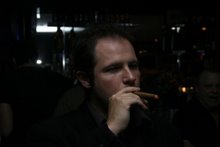6/17/2013
Infinity PLUS ONE!
The English language has some foibles, probably more than the majority of concurrent tongues. Our grammar is uneven, ascriptions of meaning can be arbitrary and there are oh-so-many-instances of 'that's just how you say it.' The most discerning of us, even professional linguists, have trouble with some of the minutiae of the language. I, for instance, will probably never master "Lay" and "Lie." But there's one point of English, moreover, one point of rhetoric that really apprehends my impala.
Not all words have a superlative. Their tone, their insinuation of meaning, cannot be increased through the application of adverbs or descriptive clauses and trying to do so will turn an otherwise articulate individual into a babbling yokel.
There are three such instances where I find individuals make these errors.
First are words that already connote the ends of the spectrum that cannot be surpassed. They tend to come in pairs and the generally end with the suffix "est": most/least, biggest/smallest, furthest/nearest. This is the mistake that seems to appear the least. It's almost a toddler's trope, something said by proto-lingual children who have not yet reached the conservation phase of psychological development. No less, I oh-too-often hear adults say, "That's the most dumbest thing ever." Those people are idiots.
More vexing are those people who misuse words that connote an absolute state*: unique, impossible, omnipotent, infinite**, individual, universal, etc. These ideas do not have varying degrees. These words cannot be superlatized because anything that modifies them alters their very definition. One thing cannot be more unique than another; they are each one of a kind or not.
What nettles me is hearing absolute terms coupled with superlatizing words in ways that are intellectually lazy. "She's the most unique person I know," is a non-statement. They mean "She's the most engaging, creative, memorable or the least like those around her, person that I know."
Finally, there are those places where superlatives are not strictly incorrect but where they are rhetorically clunky, the moments when the idea encapsulated in the word does not lend itself to being altered: very historical, most immense, extremely starving. Even though there's no structural error to this last set of examples, they're the ones that bother me the most.
Words are weapons. Keep them sharp and use them wisely.
* I concede that there is some metaphorical wiggle room with these terms. For instance, when referring to pre-natal development, we often say that one woman is more pregnant than another even though pregnancy is a binary state. I'm unbothered by such use, though I'd like to see someone come up with a more elegant way to express that thought.
** I understand that, when used as a strictly mathematical term, there are degrees of infinity. I'm not referring to these instances, which are very narrow in scope (which is funny given this particular word). The folks who are going to make this mistake are not using the word in this sense. Besides, I'm not a mathematician, I'm a language harpy.
Subscribe to:
Post Comments (Atom)


No comments:
Post a Comment